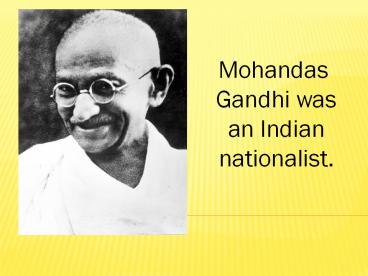Mohandas - PowerPoint PPT Presentation
Title:
Mohandas
Description:
Mohandas Gandhi was an Indian nationalist. He was also a nonviolent activist. Gandhi believed in satyagraha or truth-force. He believed that goodness ultimately ... – PowerPoint PPT presentation
Number of Views:447
Avg rating:3.0/5.0
Title: Mohandas
1
Mohandas Gandhi was an Indian nationalist.
2
He was also a nonviolent activist.
3
Gandhi believed in satyagraha or truth-force. He
believed that goodness ultimately prevailed.
4
Gandhi believed that people were fundamentally
good. When people acted badly, it was out of
ignorance.
5
Nonviolent action produced change without
increasing hatred.
6
Gandhi organized a boycott of British cloth. He
encouraged Indians to stop buying foreign goods.
7
It was better for Indians to make their own
clothing than put money into the pockets of
Imperialists.
8
If imperialism was not profitable, the
imperialists would leave India.
9
Gandhi also encouraged Indians to engage in civil
disobedience.
10
Civil disobedience is to deliberately break an
unjust law. It is an intentional noncooperation
with injustice.
11
Gandhi believed it was better to be imprisoned
than to cooperate with injustice.
12
Of course, it is difficult to govern a colony
where the colonial subjects refuse to obey the
laws.
13
During the Salt March, Gandhi and his followers
marched to the sea.
14
They marched to the sea to make salt. It was
against the law to make salt.
15
Thousands of Indians were imprisoned.
16
Slowly, the British began to realize that it was
time to leave India.
17
But before the British left India, they
partitioned or divided the subcontinent.
18
They created Pakistan for Indian Muslims and
India for a Hindu majority.
19
Indian Muslims believed that they would not be
safe in a Hindu-dominated society.
20
Terrible rioting ensued as millions of Indians
moved across borders.
21
Jawaharlal Nehru became the first prime minister
of an independent India.
22
Nehru pursued a policy of nonalignment or
neutrality during the Cold War.































